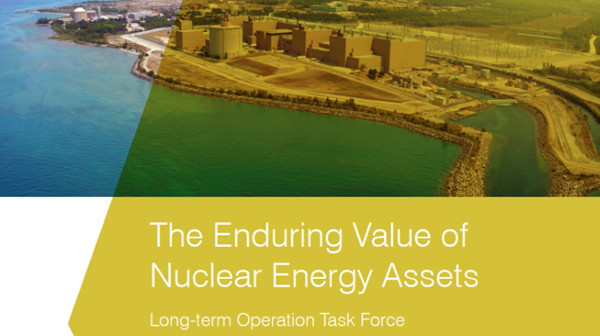LTO essential for cost-effective climate benefits of nuclear
More governments must introduce policies to support the long-term operation (LTO) of nuclear power plants to maximise the environmental, employment and economic benefits they bring, the World Nuclear Association said June 30 on the publication of its new technical position paper The Enduring Value of Nuclear Energy Assets.

(Image: World Nuclear Association)
Issued by the World Nuclear Association's Long-term Operation Task Force, the paper calls on governments to: invest in basic education and higher-level academic institutions and training programmes to ensure that there is a skilled pool of workers; develop an industrial strategy so that the supply chain is in place; reform markets so that they value the non-power benefits of nuclear alongside other clean energy technologies; and ensure that, in those countries where public participation for LTO is a requirement, the process is transparent and that stakeholders are provided with fact-based information not only on safety and environment risks but also on socio-economic benefits.
"Ensuring today's nuclear plants achieve long-term operation is an urgent policy challenge. If government are serious about climate change and energy resilience they should not allow such plants to retire," World Nuclear Association Director General Agneta Rising said.
The LTO of nuclear power plants is, in most energy markets, the lowest-cost option for generating electricity on a levelised cost of electricity basis, and is expected to stay that way for decades to come, the Association said. There is no fixed technical limit to the lifespan for most reactors technologies, it said, and the LTO of nuclear plants has been successfully demonstrated globally and is now standard practice, with planned operating lifetimes of 60 to 80 years now commonplace. Another advantage of LTO is that it acts as a bridge to new build, preserving core competencies within the industry, helping to retain highly-skilled jobs and support local communities.
The technical position paper describes the benefits of LTO and the main considerations that need to be taken into account to ensure the longevity of nuclear operations in the years ahead.
"It is not enough for policy makers to simply legally allow LTO; they need to remain actively supportive of their country's nuclear sectors and ensure policy continuity for LTO to occur," the report says. "They should invest in the necessary infrastructure - providing resources for education and training, implementing an industrial strategy and redesigning energy markets to recognise the benefits nuclear energy brings. With the help of governments, existing nuclear plants will play a larger role in helping to reduce emissions, lower energy bills and keep the lights on than previously envisioned."
The LTO Task Force provides a forum for experts from throughout the industry to exchange leading practice and new developments in relation to long-term operation. It further seeks to: demonstrate through research, analysis and development of positions that long-term operation of nuclear facilities is proven and viable; identify and advocate policies that can help facilitate the long-term operation of nuclear facilities; promote improved safety, efficiency and innovation in long-term operation.
Researched and written by World Nuclear News
- China Institute of Atomic Energy
- Nuclear Power Institute of China
- Southwestern Institute of Physics
- China Nuclear Power Operation Technology Corporation, Ltd.
- China Nuclear Power Engineering Co., Ltd.
- China Institute for Radiation Protection
- Beijing Research Institute of Uranium Geology (BRIUG)
- China Institute of Nuclear Industry Strategy (CINIS)
- China Nuclear Mining Science and Technology Corporation


